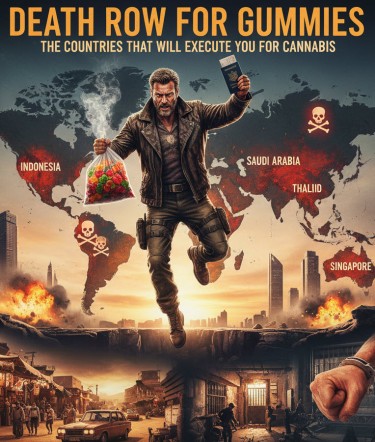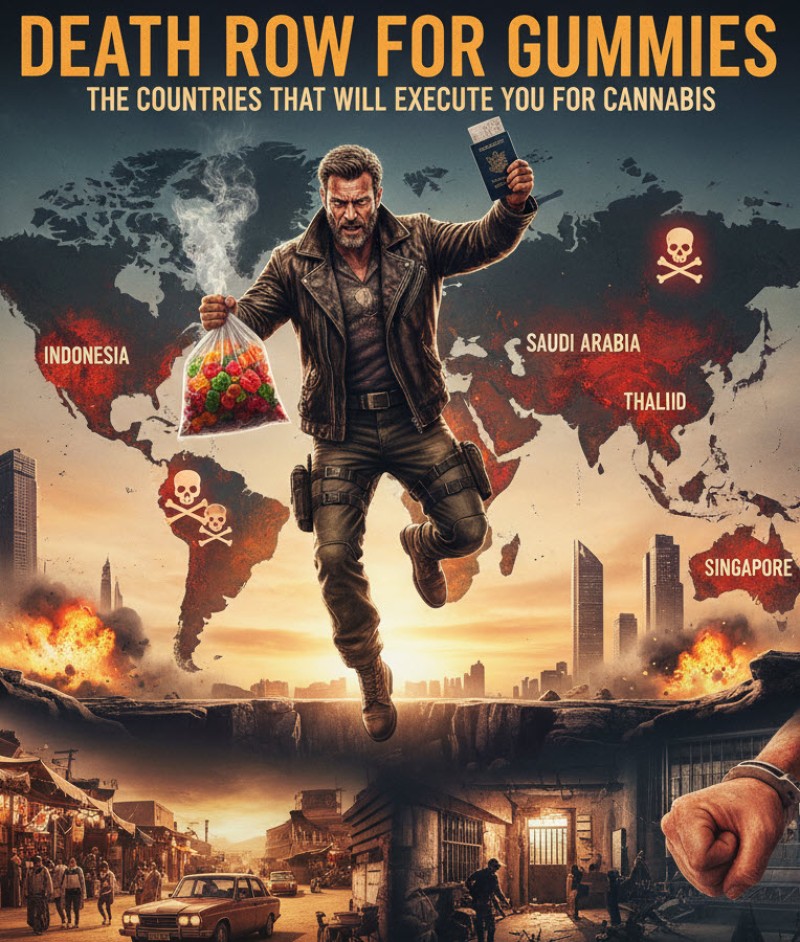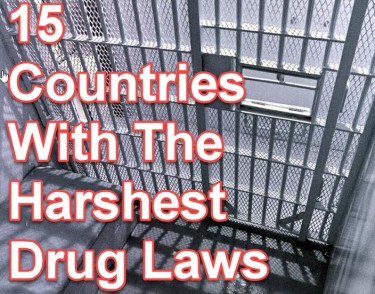
Jarred Shaw is a 35-year-old American basketball player who helped his team win Indonesia's 2023 Basketball League championship. He's also a Texan with Crohn's disease—a chronic inflammatory bowel condition that causes debilitating pain and has no cure. Like many Crohn's patients who've exhausted conventional treatments, Shaw found relief through cannabis. Specifically, he used cannabis gummies to manage his symptoms and maintain some quality of life while pursuing his athletic career overseas.
In May 2025, Indonesian law enforcement arrested Shaw after he received a package containing over 100 cannabis gummies. He now faces the potential death penalty. Not life in prison—though that would be absurd enough for medicine. Not deportation—though that would be the rational response for a foreigner possessing a controlled substance. Death. By firing squad. For treating his incurable medical condition with a plant that's legal for medical use in 38 U.S. states and counting.
The gummies weighed 869 grams total, which Indonesian authorities used to charge him with possessing essentially a kilogram of marijuana—despite the fact that most of that weight came from sugar, gelatin, and other non-cannabis ingredients in the edibles. As Shaw himself noted in an interview with The Guardian, "They're making it seem like I'm this big drug dealer. Why would I bring the candy here to sell? It was for personal use."
Shaw spent his first two months in detention at what he described as "the lowest point in my life," in a "really dark mental place" where he "didn't want to wake up again." He's now waiting in pre-trial detention in Jakarta, uncertain whether the U.S. government will designate him as wrongfully detained—a status that has helped secure the release of other Americans imprisoned abroad for cannabis, including Marc Fogel in Russia and WNBA player Brittney Griner.
This isn't an isolated incident. This is the reality of cannabis prohibition in 2025: while half the United States has legalized recreational cannabis and countries like Canada, Uruguay, Thailand, and Germany have embraced full legalization, dozens of nations still impose prison sentences, corporal punishment, and execution for possessing a plant that has never caused a fatal overdose in recorded human history.
Shaw's case should serve as a wake-up call for anyone who travels internationally and uses cannabis—whether medicinally or recreationally. The world is not uniform in its cannabis laws. Some countries will confiscate your stash and send you home. Others will throw you in prison for years. And some will execute you. Not metaphorically. Not as hyperbole. They will literally put you to death for cannabis.
This article serves two purposes: first, to provide essential information that could save your life or freedom if you travel internationally. Second, to condemn—in the strongest possible terms—the barbarism of executing human beings for possessing, using, or distributing a plant. Every sovereign nation has the right to set its own laws, but that doesn't mean those laws are just, rational, or deserving of anything but international condemnation.
Death Row for a Plant: The Countries That Will Execute You
Let's be brutally clear about what we're discussing here: state-sanctioned murder of human beings for non-violent drug offenses. As of 2025, at least 34 countries retain the death penalty for drug offenses, including cannabis. Some actively enforce these laws with regular executions. Others maintain the laws on the books but haven't carried out executions in years. All of them represent a grotesque violation of human rights and basic proportionality in justice.
Singapore leads the world in aggressive enforcement of cannabis death penalties. The city-state enforces a mandatory death sentence for anyone caught trafficking more than 500 grams of cannabis—just over one pound. There's no judicial discretion in most cases; cross that threshold and you hang. Period. In 2023, Singapore executed multiple people for cannabis offenses, including one man hanged for trafficking just over one kilogram of marijuana. Lesser amounts result in long prison sentences and caning—a form of corporal punishment that involves whipping with a rattan cane that causes permanent scarring.
Singapore doesn't care if you're a citizen, a tourist, or a medical patient. The law applies equally, and the government proudly touts its zero-tolerance approach. Dozens of prisoners sit on Singapore's death row right now for drug offenses, including cannabis cases involving people with mental health issues, elderly defendants, and individuals who claimed possession for personal use. The courts rarely show mercy.
Malaysia recently reformed its mandatory death penalty for drug trafficking, but don't mistake reform for leniency. Anyone caught with 200 grams of cannabis or more is automatically presumed to be trafficking and faces potential execution by hanging. The 2023 reform gave judges discretion to impose life imprisonment instead of mandatory death, but execution remains a possible sentence. As of late 2023, approximately 55% of Malaysia's death row population was there for drug offenses.
Indonesia—where Jarred Shaw currently awaits trial—technically allows the death penalty for drug trafficking involving more than one kilogram of raw drug materials. The country hasn't carried out drug-related executions since 2016, largely due to public outcry, but hundreds of people sit on death row for drug offenses, and the law remains in effect. Shaw's case demonstrates that prosecutors still pursue capital charges, and his fate depends on judicial discretion, political pressure, and whether the U.S. government intervenes diplomatically.
Saudi Arabia operates under Sharia law interpretations that classify drug trafficking as a capital offense. The kingdom executes people by public beheading, and it resumed drug-related executions in late 2022 after a brief unofficial moratorium. In 2023, Saudi Arabia executed dozens of people for narcotics offenses. While most cases involved stimulants or heroin, cannabis is not exempt—even relatively small amounts of hashish or marijuana have resulted in death sentences. For smaller possession charges, Saudi Arabia employs a three-strike system: six months in jail for the first offense, seven years for the second, and death for the third.
China imposes some of the world's harshest drug laws under broad provisions for "especially serious" narcotics offenses. Cannabis trafficking is punishable by 15 years to life or execution, with the death penalty reserved for large quantities. China doesn't publish comprehensive statistics on executions, but the country is believed to execute more people annually than all other nations combined, with drug offenses representing a significant portion.
Iran technically loosened its drug laws in 2018, raising the threshold for cannabis death penalties to 50 kilograms for possession and five kilograms for trafficking. Before the reform, an estimated 5,000 people sat on death row for drug offenses, with 90% being first-time offenders between ages 20-30. While Iran reduced executions following the reform, the death penalty for drug crimes remains very much in effect.
United Arab Emirates (including Dubai, a popular tourist destination) maintains the death penalty for drug trafficking, though execution is not mandatory and judges have discretion. The country handed down at least four death sentences for drug offenses in 2023, all against foreign nationals. Possession of even small amounts of cannabis results in lengthy prison sentences—typically four years minimum—followed by deportation. Dubai's glittering facade and tourist-friendly marketing obscure the reality of its harsh drug laws.
Other countries with capital punishment for cannabis offenses include Egypt, Vietnam, Laos, Myanmar, Sudan, Yemen, Iraq, Kuwait, Bahrain, Qatar, Oman, and Brunei. Some enforce these laws actively; others haven't carried out executions in years but maintain the legal framework to do so.
Even the United States technically has a death penalty for cannabis on the books under the "Kingpin" provision of the Federal Death Penalty Act, which allows capital punishment for large-scale drug trafficking involving at least 60,000 cannabis plants or kilograms. While this has never been enforced for cannabis and seems unlikely given the current political climate, the law exists—a reminder that barbaric policies aren't exclusive to authoritarian regimes.
The Traveler's Nightmare: What You Need to Know Before You Go
If you use cannabis—medicinally or recreationally—you need to understand that your home country's laws mean absolutely nothing the moment you cross an international border. Your medical marijuana card from California? Worthless in Tokyo. Your legal recreational purchase from a Colorado dispensary? A prison sentence in Singapore. Your CBD oil for anxiety? Potentially a death sentence in Malaysia.
Here's what every cannabis user needs to know before traveling internationally:
Zero tolerance means zero tolerance. Countries like Singapore, Japan, and the UAE don't care about your intentions, your medical conditions, or your home country's laws. They don't distinguish between medical and recreational use. They don't care if you're a first-time offender or if you have a prescription from a licensed physician. The law is the law, and enforcement is absolute.
Japan will imprison you for up to seven years for simple possession of any amount of cannabis. Japanese law is so strict that you can be prosecuted for using cannabis abroad—even in countries where it's legal. If you're a Japanese citizen who smokes weed in Canada and tests positive upon returning home, you can face criminal charges. Foreign residents have been deported for cannabis offenses, and the country's culture views cannabis use as a serious moral failing.
South Korea has similar extraterritorial enforcement. South Korean citizens can be prosecuted for using cannabis in countries where it's completely legal. If a Korean citizen visits Amsterdam, smokes in a coffee shop, and returns home, they can face criminal charges in South Korea based on drug tests or social media posts. The country treats cannabis identically to heroin or methamphetamine, with no distinction for relative harm.
United Arab Emirates and Dubai are particular traps for tourists. Dubai markets itself as a luxury destination, but its drug laws are draconian. Possession of even trace amounts—we're talking residue in a pocket or detectable THC metabolites in your bloodstream—can result in four-year prison sentences. Multiple tourists have been arrested at Dubai International Airport because drug-sniffing dogs detected microscopic amounts of cannabis in their luggage or on their clothing. Having a joint three weeks ago in Los Angeles can get you imprisoned in Dubai if they test your blood or urine.
Indonesia, the Philippines, and Thailand (despite recent reforms) remain risky destinations. While Thailand legalized cannabis in 2022, making it the first Southeast Asian country to do so, enforcement remains inconsistent and the political situation is unstable—conservative elements are pushing for re-criminalization. Indonesia, as Shaw's case demonstrates, actively prosecutes foreigners for cannabis offenses. The Philippines has a history of extrajudicial killings under former President Duterte's drug war, and while official policy has softened, the cultural hostility toward drugs remains intense.
Turkey will imprison you for two to five years for cannabis possession. The country is popular among Americans seeking medical tourism for procedures like hair transplants, and some tourists have been shocked to discover that Turkey doesn't share Europe's relatively relaxed attitudes toward cannabis despite its geographic proximity.
Practical advice for travelers:
-
Never travel internationally with cannabis in any form. Not flower, not edibles, not vape cartridges, not tinctures, not CBD products. Nothing. The risk isn't worth it, no matter how much you rely on cannabis for medical purposes.
-
Research local laws before booking travel. Don't assume that because a country is modern, developed, or tourist-friendly that it has reasonable drug policies. Dubai and Singapore are gleaming modern cities that will imprison or execute you for cannabis.
-
Be aware of detection windows. THC metabolites can remain detectable in urine for weeks after use, in blood for days, and in hair for months. Some countries conduct drug tests on arriving passengers or during routine traffic stops. If you've used cannabis recently and you're traveling to a zero-tolerance country, you could test positive despite not possessing anything.
-
Clean everything. If you've transported cannabis in luggage, bags, or clothing, microscopic residue can remain even after washing. Drug-sniffing dogs at international airports are trained to detect these trace amounts. Consider using dedicated travel luggage that has never been in contact with cannabis.
-
Don't discuss cannabis use on social media before or during travel. Some countries monitor social media, and posts about cannabis use can serve as evidence for prosecution even without physical possession.
-
Register with your embassy. If you're traveling to a country with harsh drug laws, register your travel plans with your embassy through programs like STEP (Smart Traveler Enrollment Program) for Americans. This won't prevent arrest, but it can facilitate diplomatic intervention if something goes wrong.
-
Understand that "medical use" isn't a defense. Marc Fogel was a registered medical marijuana patient in Pennsylvania when Russia imprisoned him for 14 years for possessing a half-ounce. Jarred Shaw uses cannabis for Crohn's disease, and he's facing execution. Your medical condition and doctor's recommendation mean nothing under foreign law.
The bottom line: if you can't travel without cannabis, don't travel to countries with harsh prohibition. It's that simple. No vacation, no business opportunity, no athletic career is worth risking your life or freedom.
The Sticky Bottom Line: Sovereignty Doesn't Excuse Barbarism
Every sovereign nation has the right to establish its own legal framework and criminal penalties. International law recognizes this sovereignty, and countries routinely resist external pressure on domestic policy. I understand this principle, and I'm not advocating for military intervention or sanctions over cannabis laws.
But sovereignty doesn't mean we can't call barbarism by its name. Executing human beings for possessing, using, or distributing a plant is barbaric. It's disproportionate. It's unjust. And it deserves international condemnation regardless of cultural differences or domestic authority.
Cannabis has never caused a fatal overdose. It's less harmful than alcohol by virtually every measurable metric. It has documented medical applications for pain, nausea, seizures, inflammation, and numerous other conditions. Millions of people worldwide use it responsibly without harming others. And yet some countries respond to cannabis possession with the ultimate punishment—death—while simultaneously allowing cigarettes and alcohol, substances that kill millions annually.
The logic is incoherent. If the death penalty is reserved for the most serious crimes—murder, terrorism, treason—how does possessing cannabis qualify? Jarred Shaw didn't kill anyone. He didn't assault anyone. He didn't steal from anyone. He treated his medical condition. And for this, Indonesia considers execution an appropriate response.
This isn't about cultural relativism or respecting different values. Some practices are universally wrong. We don't excuse honor killings, female genital mutilation, or slavery because they're "cultural traditions" in some regions. We recognize them as human rights violations. Executing people for cannabis falls into the same category—a practice so fundamentally unjust that it demands universal condemnation.
The international community should pressure countries that maintain death penalties for drug offenses to abolish these laws. Pakistan recently eliminated the death penalty for drug crimes in July 2023, becoming the first country in over a decade to do so—demonstrating that reform is possible. Malaysia reformed its mandatory death penalty in 2023, giving judges discretion to impose life imprisonment instead. These are steps in the right direction, but they don't go far enough.
Organizations like Harm Reduction International, Amnesty International, and Human Rights Watch document drug-related executions and advocate for abolition. Their work is essential, but it requires public support and political pressure. When countries like Singapore execute cannabis traffickers, there should be diplomatic consequences. When Indonesia threatens Americans with death for medical marijuana, the U.S. government should respond forcefully.
The absurdity of cannabis prohibition is becoming increasingly apparent as legalization spreads globally. We're creating a bifurcated world where cannabis is a legal, regulated commodity in some countries while remaining a capital offense in others. This inconsistency isn't sustainable, and it places travelers, medical patients, and ordinary citizens at risk of draconian punishments for behavior that's completely legal just across a border.
Jarred Shaw's case should outrage everyone who values proportional justice and human rights. A 35-year-old athlete treating a chronic medical condition should not face execution. Period. The U.S. government should designate him as wrongfully detained, pursue every diplomatic avenue for his release, and make clear that executing Americans for medical cannabis will have serious bilateral consequences.
For the rest of us, the lesson is stark: the world is not safe for cannabis users. Not yet. Despite progress in many countries, vast regions maintain laws so harsh that a single mistake—bringing a vape cartridge through the wrong airport, testing positive at the wrong border—can cost you years of freedom or your life.
Travel carefully. Stay informed. And never forget that while we celebrate legalization victories at home, millions of people worldwide still live under cannabis prohibition enforced with imprisonment, torture, and execution. Their fight for freedom and justice is our fight too.






